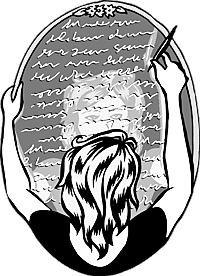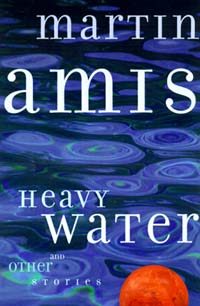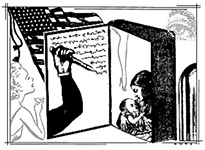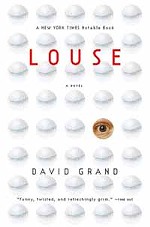Personal Effects
By Stacy Bush, Fri., April 16, 1999
|
|
Susan Cheever's third memoir, Note Found in a Bottle: My Life as a Drinker,is typical of the personal memoir genre. Cheever writes about a life which she largely believes was determined by a heritage of alcohol. Cocktail hour was magical in the Fifties suburbs where Cheever grew up; for many years, Cheever was convinced that drinking was the path to maturity and sophistication, despite her father's notorious alcoholism. Presumably, it's also what fueled her marriages and affairs as well as alternately firing and short-circuiting her ambitions. It's inarguable that Cheever's alcoholism warped her judgment but, as she herself admits, all her transgressions, romantic, egocentric, and otherwise, can't be attributed to liquor. An alcohol haze can't account for Cheever's extreme lack of self-awareness.
As the context of Note Found in a Bottle narrows to a recitation of Cheever's emotional reactions to her domestic dramas, the writing slackens: "A lot of my old feelings started bumping around in the attic where I had put them. There were crashing sounds as if someone was going wild up there, and rattling sounds as if someone was trying to escape into my conscious mind." Prose "seemed to burn right on the page," and life has "a great tapestry." Cheever displays candor and only occasionally does she try to equivocate some of her less admirable choices. Recounting her lunches with her father, by now a recovering alcoholic, she notices that he's anticipated her request for a glass of white wine: "He knew how important it was for someone like me to have a drink waiting for them. That's the kind of thing alcoholics understand about other alcoholics, but my father never talked to me about my drinking; not then, not ever." However, Cheever seems either unwilling or unable to decipher the meanings of her father's actions. Does she really still think he asked that she accompany him to his AA meetings just for the pleasure of her company? Cheever also has the bad habit of undercutting the earnest intent of her statements with her examples. Consider her account of an affair she had with author Robert K. Massie during her second marriage to Calvin Tomkins, the author of Duchamp: A Biography: "Bob Massie treated me with a seriousness that I craved. Reflected in his eyes, I saw myself as an important writer. 'Does Calvin always marry beautiful women?' he asked me." There's more than a bit of unintentional irony here.
The limited context of the personal memoir is considered a major weakness of the genre. Elisabeth Dyssegaard, an editor at Farrar, Straus & Giroux, strives to find memoirs that transcend this problem. "I am interested in memoirs that reflect on issues larger than one person's life," she says. Dyssegaard has edited two memoirs recently: Walking Out on the Boys, Dr. Frances Conley's account of sexism and harassment at Stanford University Medical School, and Tara Bahrampour's To See and See Again: A Life in Iran and America, a young Iranian-American woman's history of growing up in two vastly different cultures. "I was attracted to both of these stories because these dealt with themes beyond the merely personal," Dyssegaard says. "For example, the world of medicine is very hermetic and the point of view that an insider like Frances Connolly can offer is particularly valuable. It's most important to see that many of those in power at a place like Stanford Medical School can't even treat their own colleagues well. ... Tara Bahrampour's deals with the complex nature of cultural identity. What defines a person as being from one place or another."
But grappling with complex themes doesn't guarantee a successful memoir. Janet McDonald's passionate and emotional memoir Project Girl describes her struggle to reconcile her impressive intellectual gifts with her life in a Brooklyn Housing project. McDonald earned degrees from Vassar, Columbia Graduate School of Journalism, and the New York University School of Law: Her achievements would have been remarkable under any circumstances, but McDonald had to contend not only with the pressures brought on by navigating the boundaries of class and race but a devastating personal trauma as well. Raped on campus her first year at Cornell Law School, she transferred to New York University but her latent rage soon took a uniquely destructive course. She was expelled from the university for setting a series of small fires. With intensive therapy, McDonald ultimately prevailed, enrolling in journalism school at Columbia, working at Newsweek, and interning at the Agence France-Presse in Paris.
But rarely has such a compelling story been told in such clunky language: "My school chums didn't believe me, I had no close friends, and the only intimate relationship I was emotionally capable of was with myself, and that, only barely," McDonald writes in her typically convoluted fashion. In short, the strength of her emotions and the veracity of her responses are undercut by clichéd rhetoric. Describing a summer internship, she claims she is "an overeducated slave on the bottom of the white patriarch's totem pole." The reader may find McDonald credible, but that is in no way due to her lackluster writing. Including a significant portion of a journal written while she was severely depressed doesn't help either; it's impossible to see the process that transformed McDonald from a suicidal/homicidal victim to a triumphant survivor since McDonald fails to make the narrative importance of her journal manifest. The problem is that McDonald keeps telling us what we should see rather than letting us see it for ourselves.
Many memoir writers are beginning or nonprofessional writers; consequently, passages of wooden, contrived prose appear fairly regularly in these narratives. Margaret Bullitt-Jonas' book Holy Hunger: A Memoir of Desire documents her battle with an addiction to overeating. Fortunately, she finds solace beyond merely dissecting the source and the manifestations of her addiction. Bullitt-Jonas is careful to emphasize her part in perpetuating her disease and it is obvious that this gives her a tremendous sense of power. But her display of soggy emotion and her use of heavy-handed, excruciatingly bad similes ruin any impact she might wield: "To resist the internal pressure of anxiety, you must be fierce. Like a warrior on the battlefield, you must stand fast." However, it's worth considering that the artlessness of many memoirs like Bullitt-Jonas' may make them more appealing to a broad section of their audience. Many readers consider this verbal awkwardness a sign of the writer's integrity. Like children with a bedtime story, they find comfort and control in language that does not surprise or challenge them.
It's refreshing to see what an accomplished writer can do with a personal memoir. University of Texas English professor Laura Furman's Ordinary Paradise is an account of her mother's early death from ovarian cancer and its emotional aftermath. Not only did Furman have to confront this loss but had to grapple with one of her mother's legacies as well -- the very same, potentially lethal disease. Ordinary Paradise was a very private project for Furman. "I had been working on it for about 10 years and I never showed it to anyone," she said in a recent interview. Furman's memoir has more in common with the essays in Natalia Ginzburg's Little Virtues.
Furman says that Ordinary Paradise is different from other memoirs because "it is not a 'scandal'-driven story. I wanted to show how even though experiences may be repressed, they will show through into a life." Though she wanted to protect the privacy of her stepmother and sisters, who make appearances in Ordinary Paradise, Furman deliberately avoided including too many biographical details for another, perhaps more compelling reason: "Everybody grows up in a different family. My experience was unique and not necessarily what my sisters experienced. They have their own versions of what happened in my family."
Furman has used her memoir's central material once before in her fiction. Her novel The Glass House concerns a woman mourning the loss of her mother. Did Ordinary Paradise offer Furman an opportunity to explore the very same emotional issues in quite a different format? "Upon the publication of the memoir, I felt it was one of the strongest pieces of writing I had done. I think everyone tells the same story in their writing over and over again and this has freed me," she says. But writing a memoir also provides unexpected challenges. "Memoirs look like such an honest, barefaced form but you know pretty quickly when you've become boring. I was surprised at how some experiences that seemed so vivid and vital to me became dull within the context of the memoir. I had to respect this problem." Furman also took a different approach to much of the highly emotional material in her book than either Cheever or McDonald. "I wrote different versions of this story with more details. This is a very stripped-down version compared to what I had." It's this restraint that makes her memoir poignant and powerful. Furman achieves more through suggestion than through explication of her every emotion and reaction. Paradoxically, it's her restraint -- not careless candor -- that reveals just how intimate and moving her material is. The strongest emotions often reveal themselves most forcefully through restraint.
However, the more you confess, the more attention you receive. In recent months, Joyce Maynard's memoir At Home in the World has enjoyed long reviews in major publications such as The New Yorker and The New York Times Book Review; a sizable excerpt was featured in Vanity Fair. The intriguing element of Maynard's memoir is her commitment to presenting a narrative that may not be completely supported by the facts she reveals. Maynard implies that her nine-month affair with J.D. Salinger, to which she devotes a third of her book, nearly destroyed her emotionally and physically and that it stunted the direction of her life. But by her own account, Maynard appears to be a remarkably accomplished and fortunate woman: She has three loving children and a viable career as a novelist and columnist for The New York Times (for years, she featured her family in her now-defunct Op-Ed column "Domestic Affairs"). The more she claims to be a neurotic naif undone by lack of love from a bad man, the more you notice the enormous amount of power she's granted Salinger; on the eve of her 44th birthday, she confronts him on his doorstep to ask about her "purpose" in his life. He brusquely rejects her and it's eerie to read that even his non-answer provides Maynard with a sense of peace and justification. The way she chose to represent herself in her life story reveals much more than she possibly intends. However unsettling it is to read about an older man's fixation with a young girl, it's also unnerving to see her exploit her youth to grasp Salinger's and the public's attention.
A fair amount of the most recently published memoirs are written by women and an even larger percentage of their audience are also women. This may be because the questions of identity that these memoirs pose are particularly complex for women. Every memoir reviewed has a narrator who tries to avoid defining herself in relation to the people around her. Nothing is written in a cultural vacuum. Alix Kates Shulman's A Good Enough Daughter is a prime example of what many baby boomers now face -- caring for their elderly parent. Shulman evocatively proves that nothing demonstrates the responsibilities of power more than caring for a pair of now physically and emotionally dependent parents. Shulman's parents were the perfect elderly couple, independent and engaged. But then her mother rapidly descended into the grips of Alzheimer's, and her father's physical condition suddenly deteriorated. After years of distancing herself from her parents, Shulman now found herself interviewing retirement homes for them, arranging to become the trustee of their estate, and selling their large, art-filled home.
Caring for aged parents is a sardonic twist on childhood. You may now be in control but your parents are once again the focus of your life, as they were when you were a child. Moreover, you must once again be rendered as helpless as a child as you face their inevitable decline. This irony is not lost on Shulman as she cares for her own parents. Her memoir explores how she had taken such effort to distance herself from her parents and establish herself apart from them; now she is once again struggling to be a good daughter, that most traditional of roles. She must confront the ultimate separation from her parents. Shulman's memoir aptly depicts the conflicts between freedom and responsibility.
It's something plenty of current memoirs badly need. Too frequently, personal memoirs feature such a narrow range of insight and show no initiative to examine anything but the author's own emotional reactions. In their mania to record every vibration of an individual psyche, many of these authors undermine their art. There's a problem when authors reveal all and all you can think of is what they aren't saying.
|
Heavy Water and |
"No," I agree. "No theme."
"But it does show how far I've come. And, you know, displays my 'incredible protean and chameleonic skills,'" Amis offered.
I'd agree with that too: But it's not just subject matter and style that vary so widely, it's also the quality of the stories, written between 1975 and 1997. While some "only just scrape by," to use the author's own expression, there is one piece, "What Happened to Me on My Holiday," that is worth the price of the book. I think it is the most emotionally intense piece of writing Martin Amis has ever done. And let me say this -- Amis fans love Amis for different reasons; there is something for each of us here.
For readers who admire intellectual contrivance, Amis is the living master: the man who based a novel on the idea of telling the story of the Holocaust in reverse. This is a writer who is to bizarre fictional propositions as Joël Robuchon is to the mashed potato, and Heavy Water serves up a heaping helping of these elegantly prepared intellectual carbohydrates. There's "Straight Fiction," in which gayness is the norm, straight movie stars are outed in the tabloids, and characters named Cleve and Orv and Irv struggle with their issues about heterosexuality over home-cooked dinners of Parma ham confit served with pomegranate, papaw, papaya, and pomelo. There's "The Coincidence of the Arts," situated in a New York where literally everyone is an artist ("The AC installers were all installationists. The construction workers were all constructivists."). Here, a dissolute British portrait painter is stalked by his 6'7" black doorman because Sir Rodney hasn't gotten around to reading the man's novel. There's "The Janitor on Mars," set in the year 2049, involving detailed communications from said custodian to Planet Earth, pedophilia in orphanages, reporting by Incarnacion Buttruguena-Hume ("the most frankly glamorous of CNN's main newscasters") and, well, I couldn't quite get through it myself.
In most cases, the sophistry is redeemed by Amis' brilliant writing, and the opening story of the collection, "Career Move," is a premier example. It is based on the premise that poets and screenwriters have traded places; the scenarists are sending SASEs to struggling, readerless quarterlies, while the poets have six-figure deals and take meetings in Hollywood:
Luke said, "How did 'Eclogue by a Five-Barred Gate' do?"
Joe said, "Domestically?" He looked at Jim, at Jeff. "Like -- fifteen?"
Luke said, "And worldwide?"
"It isn't going worldwide."
"How about 'Black Rook in Rainy Weather'?" asked Luke.
Joe shook his head. "It didn't even do what 'Sheep in Fog' did."
This Monty Pythonesque scene continues until they finally get down to the work at hand. "Okay," says Joe. "We're going with the sonnet. Now. Don has a problem with the octet's first quatrain, Jack and Jim have a problem with the first quatrain of the sestet, and I think we all have a problem with the final couplet."
Interestingly, the one story I found almost unbearably moving -- in fact, I cut it out of The New Yorker when it appeared in that magazine a few years ago and carried it around with me and couldn't stop talking about it for quite some time -- also relies on intellectual contrivance and even silliness, but here these are techniques rather than ends in themselves. "What Happened to Me on My Holiday" is a story about children's understanding of death and also about the death of a child. The narrator is Amis' son; details and names, including that of the dead boy, Elias, and Amis' wife, Isabel, are unchanged. But far from presenting unvarnished reality, the story is written in a dense dialect, a transliteration of the way the British narrator thinks Americans sound.
"My mum is Amerigan and my dad is English. I go do zgool in Longdon and my bronunziation is English -- glear, even vaindly Agzonian, the zame as my dad's. ... Amerigans zeem to zuzbegd thad the English relags and zbeeg Amerigan behind glozed doors. Shouding oud, on their return, 'Honey, I'm home!'"
Something about the language, and the effort of "translating" it -- "vaindly Agzonian" is "faintly Oxonian"; later, "gayadig" is "chaotic" -- is very funny and yields the little eurekas of solving a puzzle while what it is actually saying is so simple and so sad. This way of reading, or decoding, somehow creates in the person doing it a childlike emotional climate: a freshness, an openness. That is where you are when he delivers the pain: a totally original and unbelievably effective gambit. The story is hard to read, but as the narrator says, "I tell it thiz way -- in zargazdig Ameriganese -- begaz I don'd wand id do be glear: do be all grisp and glear."
Without telling us very much about the dead boy, but by describing the antics of a "liddle four-year-old 'guzzen‚' Bablo," he is able to tell us everything he knows about death and danger: about crab races, and swimming without floaties, and about Pablo's belief that he can bring a dead fish back to life with "vish cream," about looking over and seeing no brother in a twin bed. By the time you reach the end of this story, your guard is so far down that it will hit you just as deep as a story can go.
Amis said on the phone that his next project, a memoir of his father, the great writer Kingsley Amis, is "going at a good rate. ... It's quite fun and quite wrenching." If it has either of these qualities in the concentration they are found in "What Happened to Me on My Holiday," it will stand with the best of Amis' work, or anyone else's. -- Marion Winik










